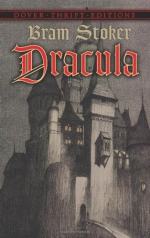“Friend John, forgive me if I pain. I showed not my feeling to others when it would wound, but only to you, my old friend, whom I can trust. If you could have looked into my heart then when I want to laugh, if you could have done so when the laugh arrived, if you could do so now, when King Laugh have pack up his crown, and all that is to him, for he go far, far away from me, and for a long, long time, maybe you would perhaps pity me the most of all.”
I was touched by the tenderness of his tone, and asked why.
“Because I know!”
And now we are all scattered, and for many a long day loneliness will sit over our roofs with brooding wings. Lucy lies in the tomb of her kin, a lordly death house in a lonely churchyard, away from teeming London, where the air is fresh, and the sun rises over Hampstead Hill, and where wild flowers grow of their own accord.
So I can finish this diary, and God only knows if I shall ever begin another. If I do, or if I even open this again, it will be to deal with different people and different themes, for here at the end, where the romance of my life is told, ere I go back to take up the thread of my life-work, I say sadly and without hope, “Finis”.
THE WESTMINSTER GAZETTE, 25 SEPTEMBER A HAMPSTEAD MYSTERY
The neighborhood of Hampstead is just at present exercised with a series of events which seem to run on lines parallel to those of what was known to the writers of headlines as “The Kensington Horror,” or “The Stabbing Woman,” or “The Woman in Black.” During the past two or three days several cases have occurred of young children straying from home or neglecting to return from their playing on the Heath. In all these cases the children were too young to give any properly intelligible account of themselves, but the consensus of their excuses is that they had been with a “bloofer lady.” It has always been late in the evening when they have been missed, and on two occasions the children have not been found until early in the following morning. It is generally supposed in the neighborhood that, as the first child missed gave as his reason for being away that a “bloofer lady” had asked him to come for a walk, the others had picked up the phrase and used it as occasion served. This is the more natural as the favourite game of the little ones at present is luring each other away by wiles. A correspondent writes us that to see some of the tiny tots pretending to be the “bloofer lady” is supremely funny. Some of our caricaturists might, he says, take a lesson in the irony of grotesque by comparing the reality and the picture. It is only in accordance with general principles of human nature that the “bloofer lady” should be the popular role at these al fresco performances. Our correspondent naively says that even Ellen Terry could not be so winningly attractive as some of these grubby-faced little children pretend, and even imagine themselves, to be.




